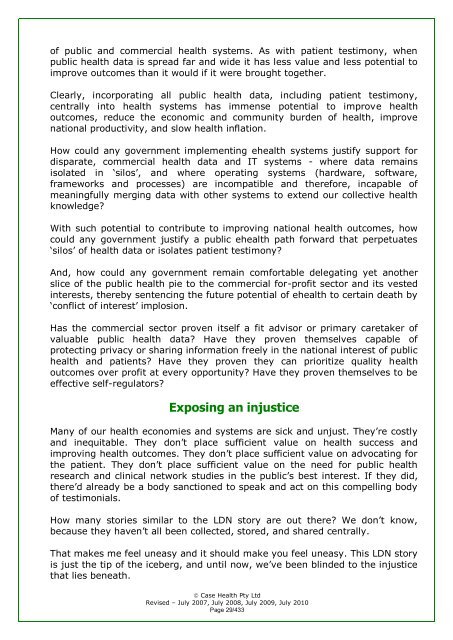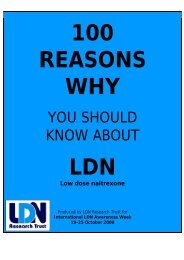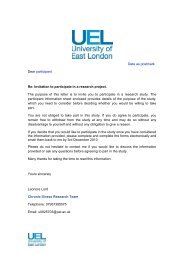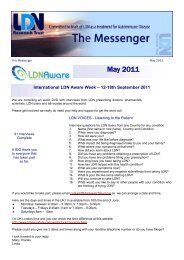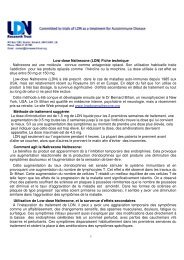- Page 1 and 2: Those Who Suffer MuchKnow Muchabout
- Page 3 and 4: dedicated to Dr Bernard Bihariand a
- Page 5 and 6: 27 LDN, Trust & Patience has worked
- Page 7 and 8: Bihari Documentary, Celebrity Medic
- Page 9 and 10: Those Who Suffer MuchKnow MuchWhy w
- Page 11 and 12: In New Mexico, Dr Burton Berkson ha
- Page 13 and 14: liver. Another risk, associated wit
- Page 15 and 16: contact with patients; and the majo
- Page 17 and 18: validate and complement other quali
- Page 19 and 20: Even though those numbers seem high
- Page 21 and 22: On the downside of this spectrum, p
- Page 23 and 24: So who’s funding all the health r
- Page 25: Governments cannot rely on a privat
- Page 30 and 31: Governments first need to acknowled
- Page 32 and 33: “Those suffering from a chronic d
- Page 34 and 35: CaseStudies Case Health Pty LtdRevi
- Page 36 and 37: Evenings, as follows:Primal Defense
- Page 38 and 39: Balance, we've pretty well covered
- Page 40 and 41: shadows of the group, and will prob
- Page 42 and 43: occupy my time as the energy permit
- Page 44 and 45: 2 Until there’s a cure there’s
- Page 46 and 47: There she was - telling me my lesio
- Page 48 and 49: Carol, USA“I love knowing that I
- Page 50 and 51: In January of 2004 I was laid off f
- Page 52 and 53: I got some leg weights for Christma
- Page 54 and 55: MY STORYI am in my mid fifties. I w
- Page 56 and 57: UPDATE - August 2010 - 5 years on L
- Page 58 and 59: Interferon. Although he was surpris
- Page 60 and 61: I also have a supply of Domperidone
- Page 62 and 63: I need to continue to work to keep
- Page 64 and 65: Since I have moved out from the wif
- Page 66 and 67: venture was doing this all from Cal
- Page 68 and 69: UPDATE: March 2009Paul continues to
- Page 70 and 71: - late 2008 to present:I’m still
- Page 72 and 73: 9 LDN, MS & me - JackieLDN since Ap
- Page 74 and 75: I am hopeful that my condition has
- Page 76 and 77: 10 MS & LDN since May 2002 - JoyceL
- Page 78 and 79:
Aloe Vera freeze dried powder x hal
- Page 80 and 81:
I've also been advised by a Canadia
- Page 82 and 83:
11 Thanks to LDN I can enjoy life -
- Page 84 and 85:
In July 2007 I stopped taking the R
- Page 86 and 87:
12 LDN has been a miracle for me -
- Page 88 and 89:
Thankfully my fears didn’t last l
- Page 90 and 91:
13 My MS & TM Story - CrystalLDN si
- Page 92 and 93:
- 2004 to Sept 2005 - Klonopin- 200
- Page 94 and 95:
In the next 8 months I went from us
- Page 96 and 97:
14 I have PPMS but doing well - Emi
- Page 98 and 99:
my oncologist has me on a cancer re
- Page 100 and 101:
Cranberry Concentrate Juice 1oz dai
- Page 102 and 103:
short stay of about 8 hours. Throug
- Page 104 and 105:
Since getting a new primary care do
- Page 106 and 107:
- 3 Jan 2004 to Jul 2005 - 4.5ml Li
- Page 108 and 109:
water. I asked him when he thought
- Page 110 and 111:
About the LDN Research Trust in the
- Page 112 and 113:
MEDICATIONS/TREATMENTS (pre LDN)- 1
- Page 114 and 115:
treatment is offered locally. It's
- Page 116 and 117:
My hair began to recover after stop
- Page 118 and 119:
18 LDN gave me Hope for the future
- Page 120 and 121:
and my dad passed away 5 months lat
- Page 122 and 123:
I continue to hiccup along the way
- Page 124 and 125:
- Jan 2009 - I’ve been benefiting
- Page 126 and 127:
I have spent a lot of my time garde
- Page 128 and 129:
1981 to 1989Symptoms over the follo
- Page 130 and 131:
know about, because the system work
- Page 132 and 133:
To conclude I will end with a relev
- Page 134 and 135:
our elected Governments to help us.
- Page 136 and 137:
I was wrong! Approximately two mont
- Page 138 and 139:
I think LDN is preventing me from g
- Page 140 and 141:
I paid to go private and saw him ar
- Page 142 and 143:
23 SPMS Improved, but with hiccups
- Page 144 and 145:
I am rather disappointed as I was f
- Page 146 and 147:
24 My Two little pills are called L
- Page 148 and 149:
heat there... I came back home to d
- Page 150 and 151:
DIET- 1980s - vegetarian diet- 1992
- Page 152 and 153:
I discussed using IV Solu-Medrol wi
- Page 154 and 155:
26 MS symptom improvement a bonus -
- Page 156 and 157:
keep a diary, an advice I now also
- Page 158 and 159:
27 LDN, Trust & Patience has worked
- Page 160 and 161:
I started on 1.5mg, and did have so
- Page 162 and 163:
with dark chocolate being the worst
- Page 164 and 165:
stay in for testing and I (against
- Page 166 and 167:
29 MS plus Crohn’s plus LDN equal
- Page 168 and 169:
After talking to Dr Skip of Skip’
- Page 170 and 171:
I don't remember how, but I began t
- Page 172 and 173:
Dec. 1989, age 26. I was in horribl
- Page 174 and 175:
Having said that, LDN doesn’t all
- Page 176 and 177:
SUPPLEMENTS - PRESENT- Sept 2009 to
- Page 178 and 179:
UPDATE February 2007Here is an upda
- Page 180 and 181:
My last labs were done in mid June,
- Page 182 and 183:
31 HIV-blood & liver enzymes now no
- Page 184 and 185:
MY STORY - October 2007In 1975, I h
- Page 186 and 187:
something too that never occurred w
- Page 188 and 189:
32 LDN benefiting daughter’s HepB
- Page 190 and 191:
my daughter has done extremely well
- Page 192 and 193:
The website briefly mentioned that
- Page 194 and 195:
On the Hepatitis_Children_and_CAM_A
- Page 196 and 197:
50 LDN and ALA Benefiting HepC - Ch
- Page 198 and 199:
prescribed 3mg of Low Dose Naltrexo
- Page 200 and 201:
I was diagnosed with Primary Latera
- Page 202 and 203:
I'd had nothing to drink for hours)
- Page 204 and 205:
filler. I took no other medications
- Page 206 and 207:
I had some trouble sleeping, but no
- Page 208 and 209:
He says the man survived for over 2
- Page 210 and 211:
So I'm on a low residue diet and
- Page 212 and 213:
35 Every condition has improved - C
- Page 214 and 215:
- July 2010 to present - Amitriptyl
- Page 216 and 217:
I have been on Iscador for about 18
- Page 218 and 219:
EXERCISE OR INTERESTS- Apr 2004 to
- Page 220 and 221:
Nov 16, 2007 - week 7Paclitaxel 282
- Page 222 and 223:
I was also taking an African cancer
- Page 224 and 225:
- Feb 2010 - I exercise at a local
- Page 226 and 227:
I walk out the front of my house al
- Page 228 and 229:
39 Crohn’s best it’s ever been
- Page 230 and 231:
In June of 2004 I began experiencin
- Page 232 and 233:
Since Dr Smith began her sabbatical
- Page 234 and 235:
- May 2008 to October 2009 - 5 gram
- Page 236 and 237:
I also have him on Vit D3 50,000iu
- Page 238 and 239:
MY STORYIn mid 2003 I noticed a bit
- Page 240 and 241:
TESTS- 1985 - x-rays of lower back-
- Page 242 and 243:
was nothing wrong with me despite h
- Page 244 and 245:
MY STORYI was diagnosed with Fibrom
- Page 246 and 247:
I could get up and not have to hold
- Page 248 and 249:
45 LDN and My Peculiar Circumstance
- Page 250 and 251:
MY STORYI was married for 10 years,
- Page 252 and 253:
During this same time though, there
- Page 254 and 255:
morning and night. I tried stopping
- Page 256 and 257:
The RA is still improved and not gi
- Page 258 and 259:
Captain of his High School football
- Page 260 and 261:
Researching Pubmed, we found that m
- Page 262 and 263:
We asked a vascular surgeon in Madr
- Page 264 and 265:
At the time I was approached, I had
- Page 266 and 267:
Almost daily, I receive a call from
- Page 268 and 269:
Selenium x 1 daily (for Thyroid sup
- Page 270 and 271:
Was it the drugs, did I have some y
- Page 272 and 273:
I am now holding down a full-time j
- Page 274 and 275:
EXERCISE OR INTERESTS-MY STORY - Au
- Page 276 and 277:
My ears no longer wake me up when I
- Page 278 and 279:
The lymphoedema persisted in a cons
- Page 280 and 281:
Dr Kamau B. Kokayi interviews…Dr
- Page 282 and 283:
Dr. KokayiWow, that needs to be on
- Page 284 and 285:
Dr. Bihari Well, what happens is th
- Page 286 and 287:
discover a business partner is embe
- Page 288 and 289:
treatment of autoimmune diseases. I
- Page 290 and 291:
Interview withJuly 2009Dr David Glu
- Page 292 and 293:
potential may do the trick), at tha
- Page 294 and 295:
LDN has proven of no interest to an
- Page 296 and 297:
Cris Most of your fellow medical pr
- Page 298 and 299:
I tried it for my granddaughter Che
- Page 300 and 301:
The study took much longer than we
- Page 302 and 303:
getting a prescription, however, an
- Page 304 and 305:
Interview withDr Skip Lenz, Pharmac
- Page 306 and 307:
Cris With regard to LDN and the kno
- Page 308 and 309:
(3) 4.5mg naltrexone thereafterSinc
- Page 310 and 311:
SYMPTOM CHANGE AFTER COMMENCING LDN
- Page 312 and 313:
Case Health Pty LtdRevised - July 2
- Page 314 and 315:
Cris Have you prescribed LDN for an
- Page 316 and 317:
already know that you had MS, I wou
- Page 318 and 319:
everywhere. In fact, paracetamol is
- Page 320 and 321:
I was rather sceptical. My wife had
- Page 322 and 323:
always administered by IV or is ora
- Page 324 and 325:
As we know, over the years, several
- Page 326 and 327:
'Alpha-Lipoic Acid (Thioctic Acid):
- Page 328 and 329:
Jill S I only hold an IND # from th
- Page 330 and 331:
me Orphan Drug Status for the use o
- Page 332 and 333:
50 % of women attending my practice
- Page 334 and 335:
(1) Dr Phil Boyle, MICGP MRCGP, GP
- Page 336 and 337:
Interview withFebruary 2009Antony C
- Page 338 and 339:
Interview withLarry Frieders, Pharm
- Page 340 and 341:
Naltrexone should not be used by an
- Page 342 and 343:
I find that the collective wisdom o
- Page 344 and 345:
Cris Most of your fellow medical pr
- Page 346 and 347:
Interview withMay 2010Dr Terry Gros
- Page 348 and 349:
Whenever a physician is investigate
- Page 350 and 351:
Cris Of your research to-date, what
- Page 352 and 353:
acting as a decoy for OGF. It cause
- Page 354 and 355:
Interview withJune 2010Dr Edmond O
- Page 356 and 357:
Personal Perspective - Low Dose Nal
- Page 358 and 359:
DR MAIRA GIRONI’SLDN/PPMS PILOT T
- Page 360 and 361:
Professional Perspective - Low Dose
- Page 362 and 363:
of Medicine demonstrated that 67 pe
- Page 364 and 365:
dependence. And although the ‘off
- Page 366 and 367:
Professional Perspective - Low Dose
- Page 368 and 369:
Rheumatoid patients treated by Dr.
- Page 370 and 371:
USA MS SuffererMalcolm WestPondersW
- Page 372 and 373:
Will the same thing ever happen to
- Page 374 and 375:
through an online database. Keyword
- Page 376 and 377:
accessible to all, including health
- Page 378 and 379:
some diseases such as progressive f
- Page 380 and 381:
We know patients are being denied a
- Page 382 and 383:
LDNin theMEDIA Case Health Pty LtdR
- Page 384 and 385:
Political ProceedingsScottish Parli
- Page 386 and 387:
http://www.ldnresearchtrustfiles.co
- Page 388 and 389:
LDN CONFERENCESFirst Annual LDN Con
- Page 390 and 391:
http://www.youtube.com/watch?v=_Nh-
- Page 392 and 393:
Vox Pops - 2009 USA LDN ConferenceF
- Page 394 and 395:
Conference Interviews - Video Testi
- Page 396 and 397:
LDN Advocates - websites & mediaLDN
- Page 398 and 399:
LDN Advocates - booksUp the Creek w
- Page 400 and 401:
LDNInformation Case Health Pty LtdR
- Page 402 and 403:
disappear within the first week of
- Page 404 and 405:
Filling a Fast-release LDN Compound
- Page 406 and 407:
LDN Pilot Trials & StudiesA pilot t
- Page 408 and 409:
Fibromyalgia symptoms are reduced b
- Page 410 and 411:
Clinical Trials of low dose naltrex
- Page 412 and 413:
Opioid growth factor suppresses exp
- Page 414 and 415:
Related Research/TrialsA study of 2
- Page 416 and 417:
Circadian Pattern of Serum Leptin a
- Page 418 and 419:
An about 50,000-dalton protein in a
- Page 420 and 421:
immunohistochemistry, the number of
- Page 422 and 423:
Abstract - Results & Conclusion:The
- Page 424 and 425:
ReferencesLDN Clinical Trials/Studi
- Page 426 and 427:
McLaughlin P., Department of Anatom
- Page 428 and 429:
Foppa(1), Giulio Vignati(4) and Mar
- Page 430 and 431:
http://www.sciencedirect.com/scienc
- Page 432 and 433:
(22) LDN PIONEER WEBSITE: Goodshape


